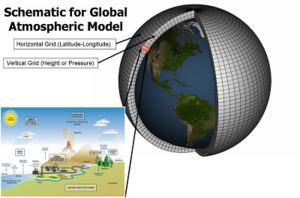Infrastructure protectionThe limitations of climate models
How accurate is the latest generation of climate models? Climate physicists have compared them with old models and draws a differentiated conclusion: while climate modeling has made substantial progress in recent years, we also need to be aware of its limitations

Latest generation climate models still have limitation // Source: wikimedia.org
How accurate is the latest generation of climate models? Climate physicist Reto Knutti from Eidgenössische Technische Hochschule Zürich (ETH Zurich) has compared them with old models and draws a differentiated conclusion: while climate modeling has made substantial progress in recent years, we also need to be aware of its limitations. We know that scientists simulate the climate on the computer. A large proportion of their work, however, is devoted to improving and refining the simulations: they include recent research results into their computer models and test them with increasingly extensive sets of measurement data. Consequently, the climate models used today are not the same as those that were used five years ago when the Intergovernmental Panel on Climate Change (IPCC) published its last report. Is the evidence from the new, more complex and more detailed models still the same? Or have five years of climate research turned the old projections upside down?
An ETH release reports that it is questions like these that hundreds of climate researchers have been pursuing in recent years, joining forces to calculate the climate of the future with all thirty-five existing models.
Together with his team, Reto Knutti, a professor of climate physics, analyzed the data and compared it with that of the old models. In doing so, the ETH-Zurich researchers reached the conclusion: hardly anything has changed in the projections. From today’s perspective, predictions five years ago were already remarkably good. “That’s great news from scientist’s point of view,” says Knutti. Apparently, however, it is not all good: the uncertainties in the old projections still exist. “We’re still convinced that the climate is changing because of the high levels of greenhouse gas emissions. However, the information on how much warmer or drier it’s getting is still uncertain in many places,” says Knutti. One is thus inclined to complain that the last five years of climate research have led nowhere — at least as far as the citizens or decision makers who rely on accurate projections are concerned.
Simplifying models in various ways
Knutti sees this in a somewhat more differentiated light. For him, there are plausible explanations as to why the uncertainties cannot be eliminated more effectively: they arise because each of the thirty-five models sets different priorities to break down the extremely complex climate system in such a way that it can even be simulated on a large-scale computer in the first place. The different models also
